Cargando...
Recursos educativos
-
Nivel educativo
-
Competencias
-
Tipología
-
Idioma
-
Tipo de medio
-
Tipo de actividad
-
Destinatarios
-
Tipo de audiencia
-
Creador
Lo más buscado
-
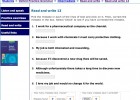
Oxford Practice Grammar Intermediate: read and write 12, a chemist
Oxford University Press (España) Organización
- 1 lo usan
- 3675 visitas
In this short text we have to spot the mistake in each line. We can practice articles, -ed and -ing adjectives and first conditional.
-
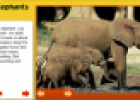
African elephants facts
Tiching explorer Organización
- 1 lo usan
- 3199 visitas
Resource consisting of a short unit which allows us to discover facts about elephants. We can read, watch pictures and videos.
-
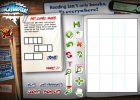
Website: Comic master
Tiching explorer Organización
- 3595 visitas
This website provides and online tool that allows us to create our own short graphic novel. It's free but we need to register.
-
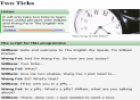
-
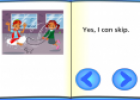
Can you...?
Oxford University Press (España) Organización
- 4469 visitas
The resource consists of an animated story. We talk about abilities ("can", short answers). We improve pronunciation and listening skills.
-
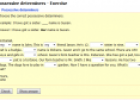
Possessive determiners
Tiching explorer Organización
- 4273 visitas
Activity designed to help us revise the possessive adjectives. We choose the correct answer in each case and we complete a short text (a letter to a friend).
-
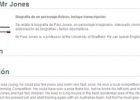
Listening: Mr Jones
Tiching explorer Organización
- 3175 visitas
We can read while we listen this brew biography about an invented character. This can be taken as a model for writing short biographies.
-
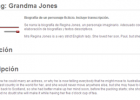
Listening: Grandma Jones
Tiching explorer Organización
- 3213 visitas
While we listen, we can read this biography about this ficticious old lady. The text part can be used as an inspiration for writing short iographies.
-
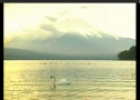
Video: Mount Fuji
Tiching explorer Organización
- 1 lo usan
- 2878 visitas
The mount Fuli is the most famous mount in Japan. By watching this short video we learn some traditions and festivals related to it.
-
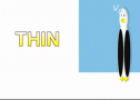
Video: Opposites
Tiching explorer Organización
- 1 lo usan
- 2723 visitas
Video animation designed to help us learn about opposites: big/small, thin/fat, short/tall, wet/dry, and cold/hot. We practice using the simple present ('to be').
Te estamos redirigiendo a la ficha del libro...













